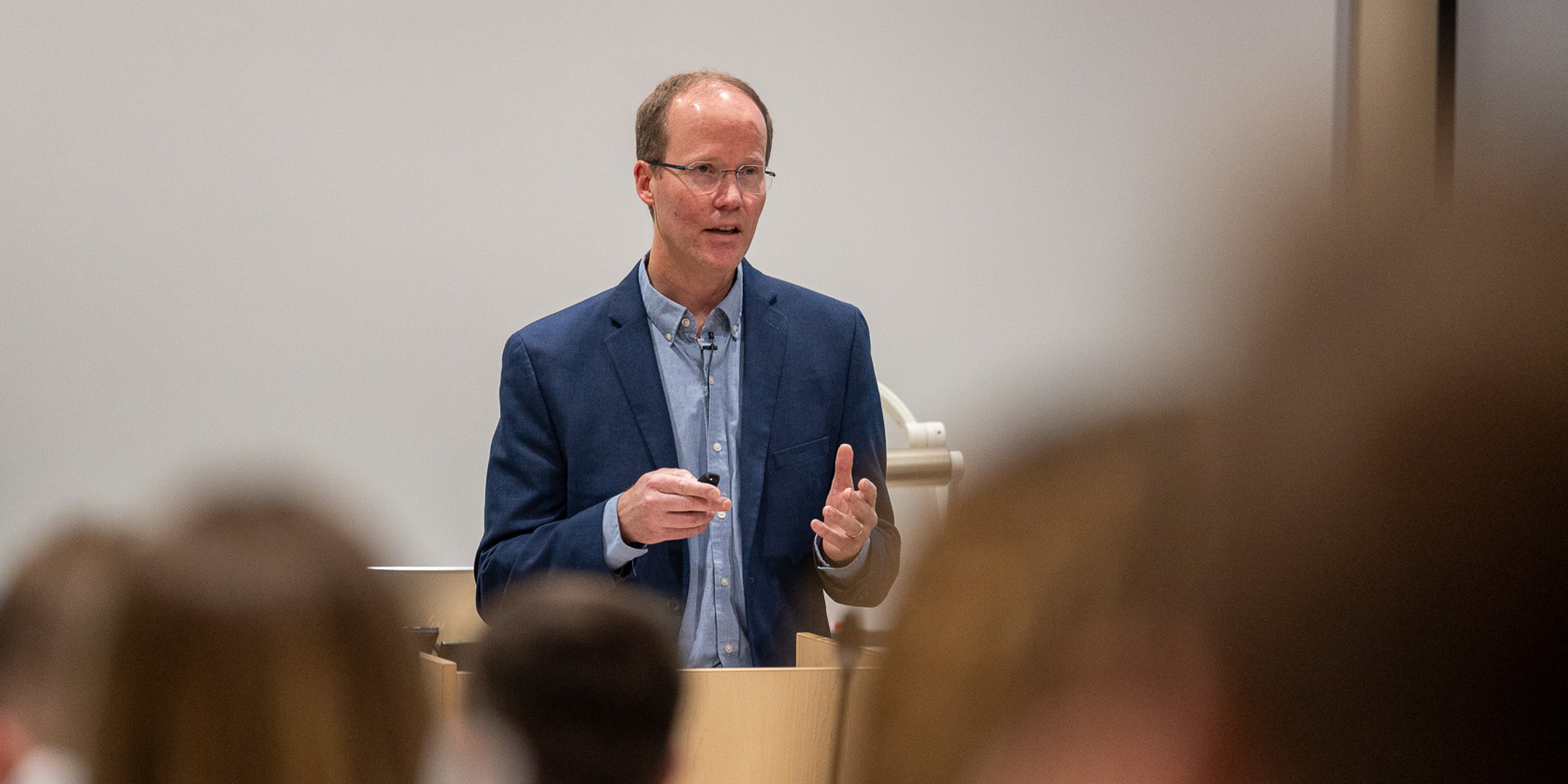Wednesday, November 20, 2024

On Friday November 8, the Liberty University College of Osteopathic Medicine (LUCOM) Medical Library hosted its 10th annual Medical Bioethics Symposium with invited guest speaker, Warren Kinghorn, M.D., Th.D., to speak on Moral Injury in Healthcare Professionals.
Kinghorn currently serves as an Associate Professor of Psychiatry, Duke University Medical Center. He also serves as an Associate Professor of the Practice of Pastoral and Moral Theology at Duke Divinity School; co-director of the Theology, Medicine, and Culture Initiative at Duke Divinity School; and is a staff psychiatrist at the Durham VA Medical Center.
He is a leading voice at the intersection of medicine, ethics, and mental health. As a Christian psychiatrist working with military veterans, his unique background in both medicine and theology equips him with a profound perspective on moral injury, burnout, and its relation to Post Traumatic Stress Disorder, with strikingly similar symptoms seen in military vets and medical professionals.
After a warm welcome from Dr. Linda Mintle, PhD., Kinghorn began his presentation on Moral Injury in Healthcare Professionals to many LUCOM professors and all the first-year medical students, as well as other students from Liberty University’s Law, Nursing and Health Science programs.
Moral injury is the experience of having acted incommensurably with one’s most deeply held moral convictions and is increasingly recognized by the mental health disciplines to be associated with postcombat traumatic stress.
“It is an important and useful clinical construct, and the phenomenon of moral injury beckons beyond the structural constraints of contemporary psychology toward something like moral theology,” Kinghorn explains
“Anyone could experience moral injury,” Kinghorn addressed the audience. “As physicians you could experience transgression based moral injury, where you or others do something or participate in something that you feel is contrary to your commitments or you could experience being betrayed by others who are in authority over you or signing up for a job or position that you may not have thought it’s what you signed up for. You may even find yourself struggling to trust the culture of the institutions that you’ve given yourself to.”
“None of this is going to prevent you from experiencing moral injury,” Kinghorn concluded. “But if you can find ways to connect to those communities and stories that allow you to build deeper roots, draw from deeper wells and above all not just see yourself as machines, but as living human beings who love, grow, yearn, desire and hope, if you can continue to think in those ways that will be a huge blessing for your present and future work.”
The annual Medical Bioethics symposium aims to bring together healthcare professionals, students, faculty, and community members to discuss critical ethical issues in medicine. It serves as a platform for learning, reflection, and engagement with complex bioethical topics, fostering dialogue and understanding around the challenges healthcare professionals face.
“This year’s goal was to deepen understanding of moral injury among healthcare professionals, highlighting its psychological and moral impacts,” Diane Garber, MLS, who organized the event, mentioned. “Through Dr. Kinghorn’s expertise, we sought to provide insights into the nature of moral injury, discuss its consequences, and share strategies for resilience and healing, ultimately supporting healthcare professionals in navigating ethically challenging situations.”
Kinghorn’s insights gave valuable guidance for healthcare professionals, emphasizing the importance of resilience, mental health, and ethical integrity in the practice of medicine. This year’s symposium was a great opportunity to engage with a thought leader on this critical issue.
For more information about LUCOM follow @LibertyMedicine on Instagram and X or Liberty University College of Osteopathic Medicine on Facebook.